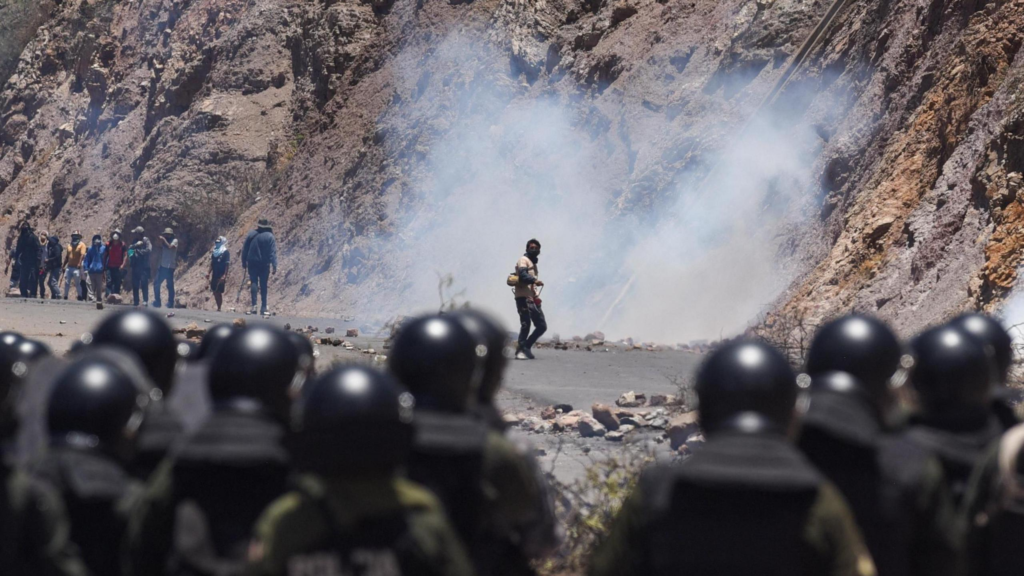In a stunning escalation of political tensions, an armed group recently stormed a military base in central Bolivia, taking more than 200 soldiers hostage. The situation has brought heightened unrest and deepened divisions within the country as accusations and counterclaims swirl between Bolivian President Luis Arce and former President Evo Morales.
With the 2025 election approaching, this incident reveals the fragile state of Bolivian politics, as supporters of Morales clash with government forces, bringing the country to a dangerous crossroads.
Hostage Crisis in Cochabamba: What Happened?
On Friday, Bolivian authorities confirmed that an armed group seized a military post near Cochabamba, holding over 200 military personnel hostage and looting the facility of its weapons and ammunition. The Bolivian government responded quickly, condemning the act and labeling it as an attack on the nation.
President Luis Arce went further, asserting that this “irregular armed group” was affiliated with former President Evo Morales, though no concrete evidence was provided to substantiate this claim. Morales, for his part, has yet to comment on the accusations, adding another layer of uncertainty to the situation.
Read : Bolivia: Journey Through the Enchanted Heart of South America
In an attempt to negotiate and de-escalate, Bolivia’s armed forces called on the group to leave the area “immediately and peacefully,” warning that any further acts would be considered treason. This dramatic standoff underscores the ongoing conflict between the government and Morales’s supporters, who have mobilized in opposition to recent moves by the Arce administration.
Read : From Lake Titicaca To Salar De Uyuni Lets Find Out Some Interesting Facts About Bolivia
This incident is just the latest episode in a series of confrontations between the two factions, and it highlights the growing polarization in Bolivia’s political landscape as both sides prepare for a potential showdown in the 2025 election.
Growing Tensions and Morales’ Supporters’ Unrest
The recent incident is not an isolated case but rather part of a series of protests and clashes that have erupted across Bolivia, particularly in Morales’s stronghold of Cochabamba. Supporters of Morales, Bolivia’s first indigenous president and a figure who retains considerable influence, have been actively challenging the Arce government.
The tipping point for these confrontations appears to be the government’s decision to pursue human trafficking charges against Morales, which his supporters view as politically motivated.
In response, Morales’s followers have organized disruptive actions, including blockades on key highways. These roadblocks have had significant consequences for Bolivian citizens, leading to severe shortages of essential goods like food and fuel in major cities.

The blockades have not only strained daily life for many but also revealed a country deeply divided along political lines. The government has accused the blockades of inciting violence, while Morales’s supporters argue they are exercising their right to protest what they perceive as an unjust targeting of their leader.
Beyond the blockades, tensions reached a new level when the Bolivian Minister of Government, Eduardo Del Castillo, accused Morales’s entourage of attempting to evade a police checkpoint by firing on officers. Del Castillo claims that individuals in Morales’s vehicle opened fire on police, who had set up the checkpoint as part of anti-drug trafficking operations.
Morales, however, countered these allegations by accusing the government of a coordinated attack to assassinate him, arguing that his vehicle was targeted without justification. This tit-for-tat exchange has fueled further animosity between Morales and the current government, increasing concerns over the stability of the country.
Political Implications and Potential for Escalation
The hostage crisis and other violent incidents underscore Bolivia’s precarious political state and the widening chasm between factions aligned with Morales and those supporting President Arce. As both sides trade accusations and the conflict escalates, Bolivia’s democracy faces a significant test. With the 2025 election looming, the nation appears to be heading toward a decisive, if not divisive, moment in its political history.

The situation raises critical questions about the stability of Bolivian institutions and the rule of law. The Arce administration is likely to face immense pressure to resolve the crisis swiftly and demonstrate its commitment to security and order.
However, actions perceived as overly aggressive or targeting Morales’s supporters could backfire, potentially deepening the divide and fostering further unrest. For Morales and his base, this period represents an opportunity to mobilize and capitalize on grievances, framing the government’s actions as an attempt to silence political opposition.
International observers are closely watching the developments, given Bolivia’s history of political volatility and the impact that instability in the region can have on neighboring countries. The upcoming election will likely play a critical role in determining whether Bolivia can bridge these divides or if it will descend further into political strife.
As Bolivia grapples with these challenges, the recent hostage crisis reflects a broader struggle for power, legitimacy, and representation within the nation. It also serves as a stark reminder of the complexities involved in transitioning to a more stable and inclusive political system in a country that has long faced issues of economic inequality, ethnic division, and social unrest.

